People sometimes ask me to write more about Poland, where I’ve been fortunate enough to live for more than a decade. Two things hold me back. The first is that I have become more conscious of feeling uncomfortable writing about Polish politics, as someone who is not himself Polish. The second is that I don’t want to give anyone the impression that I am, or think I am, some sort of expert. I’ve never studied Polish language, history and culture and wouldn’t like to be considered an authoritative voice.
But I am an enthusiast. I love Poland, in a sloppy, unscholarly, unsystematic way — as someone, I hope, who sees it as a place to love before it is a place to learn about. Here, then, are forty things I love about Poland — apolitically (so don’t go asking what I think of ZUS or Radosław Sikorski) and individually (so if something is not included, I might have never had the chance to experience it).
If it gives anybody inspiration to visit Poland then I am glad.
The taste of cold Tyskie
With summer approaching, I can see my local park dappled with sunlight, and the moisture glistening on a glass of ice-cold Tyskie. Is it the gastronomic equal of a craft IPA? Maybe not. But it’s still my favourite. It’s liquid mood music — refreshing and relaxing as you enjoy your surroundings and good company.
Christmas Eve
Why are there twelve dishes? Why is one place left empty? Why do people eat carp? When I first came to Poland, I liked Polish Christmases because of the novelty. Now I enjoy them for the same reason we all enjoy Christmas — the people. (You can read more about Polish Christmases here.)
A big plate of pierogi
Note the adjective. Pierogi do not exist to be savoured like a dish of scallops. They exist to be consumed en masse when you are at your hungriest — warm, flavourful and satisfying, like a bonfire out in the snow.
All Saint’s Day
Seeing graveyards lit up with candles is innately beautiful — but it is even more so when you remember that each flame represents happy, proud, grateful or at least meaningful memories that are being renewed every year. (You can read more here.)
Roadside shrines
These kapliczki — portraying Christ, Mary and different saints — dot Polish urban and rural landscapes, adding a touch of beauty, a dash of character and a note of existential seriousness.
Vodka with friends
Let’s face it — vodka tastes bad. You don’t need a chaser for something that you really like. Within the ritual of collective drinking, though, it acquires a strange magnetic power. It’s less like a drink and more like a sort of potion. Even the unpleasantness becomes a unifying force.
The hostels in the Beskid Mountains
After a long day of slogging through the snow, across the frozen peaks of the Beskids, you don’t want the sickly comfort of a proper hotel. Equally, though, if you’re a pampered modern like me, you don’t want a cold tent and a cup of instant soup. A plate of hot scrambled eggs, a chilled beer and a warm blanket on a bunk bed in a hostel is just what you need. Then you’re ready to do it all over again the next morning.
Toruń
I think it’s the most underrated Polish city. You should visit Toruń.
Wolves
A nation needs a wild element in its soul. I’m not the world’s smallest coward, so one time sleeping in a wolf-haunted forest was enough, but hearing their howls in the middle of the night was an effectively primal experience.
Historical resilience
Between Germany and Russia, Poland has been geographically disadvantaged. It did not exist for more than a hundred years in the era of partitioning. It lost almost six million of its inhabitants in World War Two. It withstood almost five decades of communism. Somehow, like an undersized boxer with an iron chin and a massive heart, it kept on fighting. Now, I hope, it is time for it to thrive and not just to endure.
Urban development
If you live in Britain, you might have grown used to cities looking just a bit worse — the buildings getting shabbier, the high streets getting emptier, and the streets becoming more dense with litter. In Poland, it can be the other way around. Katowice, near where I live, has become far denser, cleaner and more cultural throughout my eleven years of being here. Of course, I don’t believe in Progress with a capital “p”. The opposite can happen too — as it did in nearby Bytom when the mines went out of businesses. But for now it is a cheering development.
Joseph Conrad
Conrad would be one of my favourite writers even if he wasn’t Anglo-Poland (I wrote about his work here). That he was, though, is important — in the broad sense that it gave him such a strange exilic perspective on the world and in the very local sense that it gives me a delusional point of identification.
Dekalog
Produced at the end of the communist era, on bare, grey, smoke-ridden estates, Dekalog combined human feeling and philosophical reflection to such an exceptional extent that Stanley Kubrick — a man of few complimentary words — saluted its “dazzling skill” and profound ability to touch the heart.
“Lubię mówić z tobą” by Akurat
I’ve yet to find a situation in which this song won’t make me feel at least a bit better.
“Non omnis moriar” by Zuzanna Ginczanka
Zuzanna Ginczanka’s poem was written shortly before her death, in World War Two, at the hands of the Nazis, and acidly conveys how the Polish-Jewish poet’s soul would outlive her, in defiance of the venality of her betrayers and the cruelty of her killers. “My blood will turn their arms into wings/Transfigure the birds of prey into angels.”
“Try to Praise the Mutilated World” by Adam Zagajewski
Adam Zagajewski’s poem reflects the vivid richness of beauty and evil, of happiness and suffering, and appeals for gratitude for “the gentle light that strays and vanishes and returns” — more, rather than less, powerful for its impermanence.
Fat Thursday
Does it make sense to queue up outside a pączkarnia and stuff my fat mouth with doughnuts every February even when I do nothing for Lent? No. Will I continue to do it? Yes.
Maybe next year I’ll finally have a Twitter break.
The bracing chill of the Baltic Sea
Let’s face it: you’re not going to visit the Baltic Sea in the same spirit that you would visit Costa del Sol. Still, the sea along the Polish coastline can be very beautiful, and it has a chilly edge that emphasises its powerful inhumanity.
Gardens on balconies on flats in tower blocks
Yes, Polish tower blocks can look kind of bleak. So can tower blocks everywhere. When was the last time you heard someone say “my, what a scenic tower block”? But I always respect the people who try to add a little beauty to their home — to carve their personality into an inhumane structure. Everywhere could look nicer than it does.
The strangeness of suburbs
Until recently, at least in my corner of Poland, houses tended to be built on a house-by-house rather than street-by-street basis. Would-be residents had their own houses designed. So, one house would be yellow and one house would be green. One house would have Romanesque columns and one house would have a basement garage. Of course, some houses end up being eyesores — but there’s still a pleasant eccentricity to the whole thing.
Makówki
If you’d asked me if I wanted poppy seed cake I would have either thought that it was some terrible health food or that it was a euphemism for heroin. Actually, makówki is sweet, juicy and delicious. No Christmas is complete without emptying a tray.
Kwas chlebowy
I love alcohol, but I do have at least some awareness that it might not always be as good for me as, say, celery juice. In times when I’m feeling unusually compassionate for my internal organs, there is kwas chlebowy — cold, sweet and refreshing. In English, it’s “bread acids”, which you may not want to have known.
The seclusion of the forests
Tarnowskie Góry is all but surrounded by forests — gloriously calming places to walk and run (unless, of course, you happen to get lost). I believe that Poland has double the forest area of England, which is easier to maintain when it has more land and fewer people but remains an advantage of living here, both for people and for deer, wild boars and wolves.
The nobility of Witold Pilecki
Infiltrating Auschwitz to expose the inhumanity of Nazism could have been enough terror and honour for one lifetime. Witold Pilecki, though, returned to Poland after World War Two to resist communism as well. It got him killed — but it was an astonishing example of extraordinary courage.
The intellectualism of Leszek Kołakowski
Reassessing one’s ideas is hard enough. Reassessing one’s ideas when the political culture of one’s homeland effectively prohibits doing so is quite another thing. I said that I wouldn’t get political, yes, but I hope even an orthodox Marxist could appreciate the intellectual courage of Leszek Kołakowski — as well as the curiosity that allowed him to continue thinking and writing about other subjects.
The honesty of shop assistants
When I came to Poland, the coldness with which shop assistants treated customers was a bit startling. I couldn’t tell if they simply wanted me to leave or if they wanted me to die. Now, though, shop assistants appear to have reached a happy middle ground between the outright hostility of earlier generations and the strained cheerfulness of their English equivalents. Sometimes they are friendly. Sometimes they are silent. That’s honest. That’s life.
The sound of a good swear word
Kurwa is the Polish equivalent to fuck — versatile enough to be aggressive or admiring, and with the visceral immediacy of all good swear words. I’m also a big fan of masakra — a more poetic slang word for more contemplative occasions.
The purity of snow
For the first couple of days of the winter snow, everything looks cleaner and more beautiful. Soon, of course, the snow is transformed to black sludge — but those days are valuably meditative. (I wrote about them here.)
The openness of strangers
Ask an English person how they are and they are liable to reply “okay”. Ask a Polish person how they are and they are liable to tell you about their marital struggles, difficult children, unhealthy pets, malicious employers, and existential anguish. It can be overwhelming — but it is also charming.
The Royal Castle in Krakòw
It can be good to feel small, and the Wawel certainly inspires a sense of smallness — a giant fortified complex of buildings that was the home of Polish kings and queens and reminds one of the grandeur, as well as the struggles, of Polish history. Legend has it that a dragon lived inside the hill where the castle was eventually built, before being slain by Krakus, the founder of the city. Of course, the dragons of Polish history are never quite killed off — but they are kept at bay.
Mushroom picking
There are no better autumn activities than mushroom picking — a way to get out into nature and to make sure that you have some wonderful soup or scrambled eggs. It is good, for those of us who have been so willingly alienated from the means by which we can feed and warm ourselves, to have at least some sense of how food can reach our plate.
The strength of pensioners
There is something inspiring about watching dziadeks and babcias trudging back from the market with bags laden with vegetables. They have, for the most part, seen a lot of hard times and have an extraordinary decade-beaten instinct for survival. It inspires me, yes — though I really should offer to carry those bags.
The ambition of the young
Not all young people are ambitious, of course, just as not all pensioners are strong, but hearing a young person who aspires to be an artist, or an entrepreneur, or a doctor warms the heart. A country would not exist without the spirit of its older generations, but it will not exist without the spirit of the young.
Village churches
I love English parish churches, but their individuality is always subtle. This is no criticism. It can be part of the charm. But Polish churches can be very different — gothic, rustic, and weirdly abstract. Every one is its own new world.
Traditional restaurants in Wisła
A nation could drown in its own nostalgia. People like me, who tend to prefer the small and the local to the large-scale, have to accept that what is traditional tends to be subsidised by what is modern. Still, if there is a better dinner than a plate of placki ziemniaczane in a wooden restaurant in the Polish mountains then I’ll eat my kapelusz góralski.
The Palace of Culture of Science
An unpopular choice, perhaps, and understandably so, but I really think that Stalin’s Syringe is a powerful building, and that it’s inspiring that the Poles have reclaimed it for themselves.
Adam Mickiewicz Monument
It’s hard to imagine a market square in the UK having a statue of a poet but Adam Mickiewicz stands proudly in the middle of the rynek in Kraków. This reflects his importance in history, true, but it’s nice to think that this will also encourage the ongoing importance of the written word.
“Utopia” by Wisława Szymborska
Szymborska’s hymn for diving into “unfathomable life” dangles the thought of certainty in front of us but sees us turn again towards doubts and mysteriousness. If nothing else, how much can be contained on one island?
“Erotic” by Krzysztof Kamil Baczyński
Baczyński’s poem expresses with a poet’s control tremendous heights of feverish passion. “In the torrent of your hair, the river of your mouth …” Baczyński was later killed in the Warsaw Uprising, as was his wife.
Tarnowskie Góry

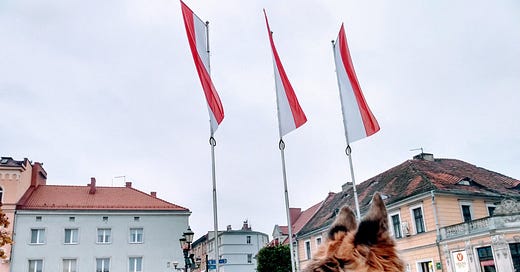


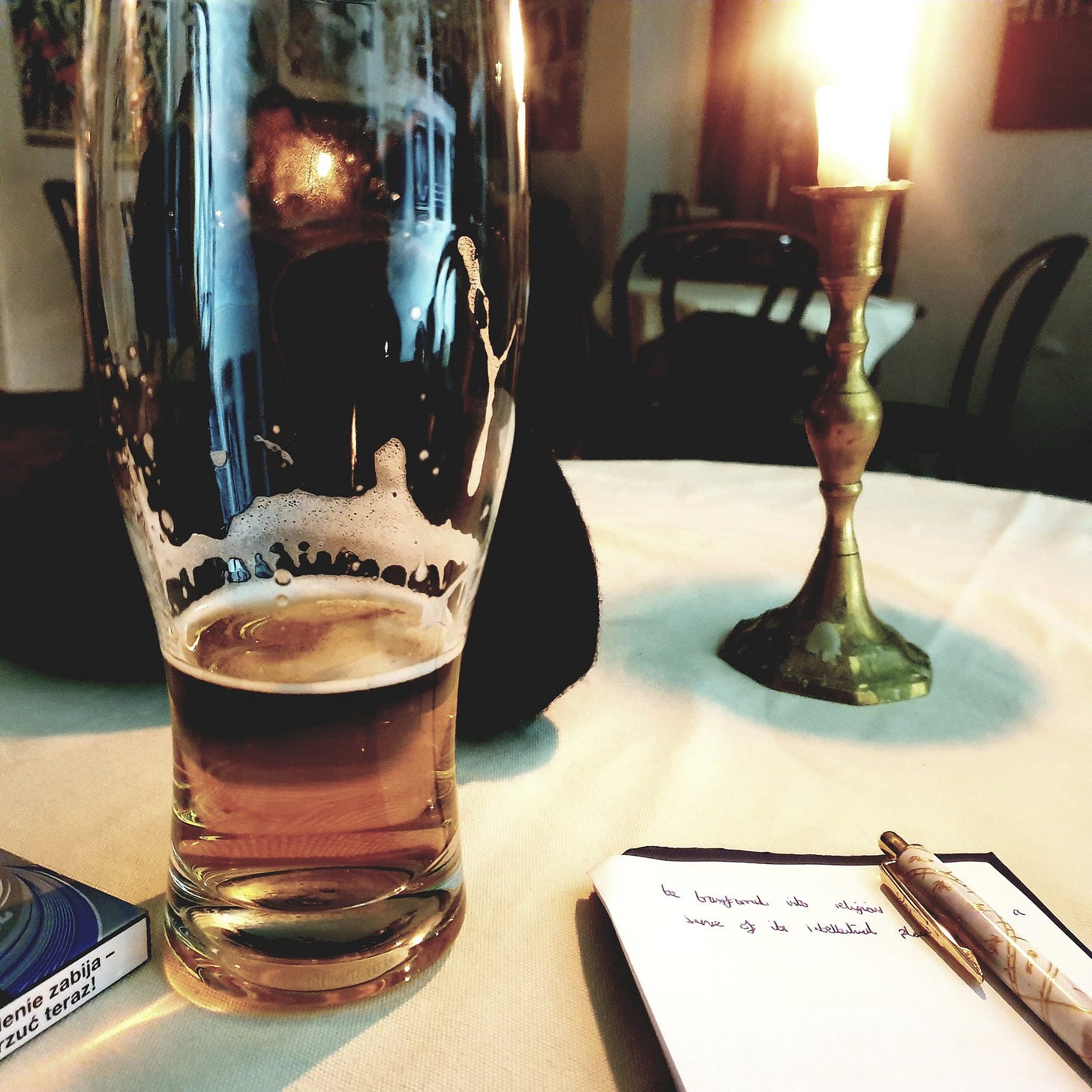
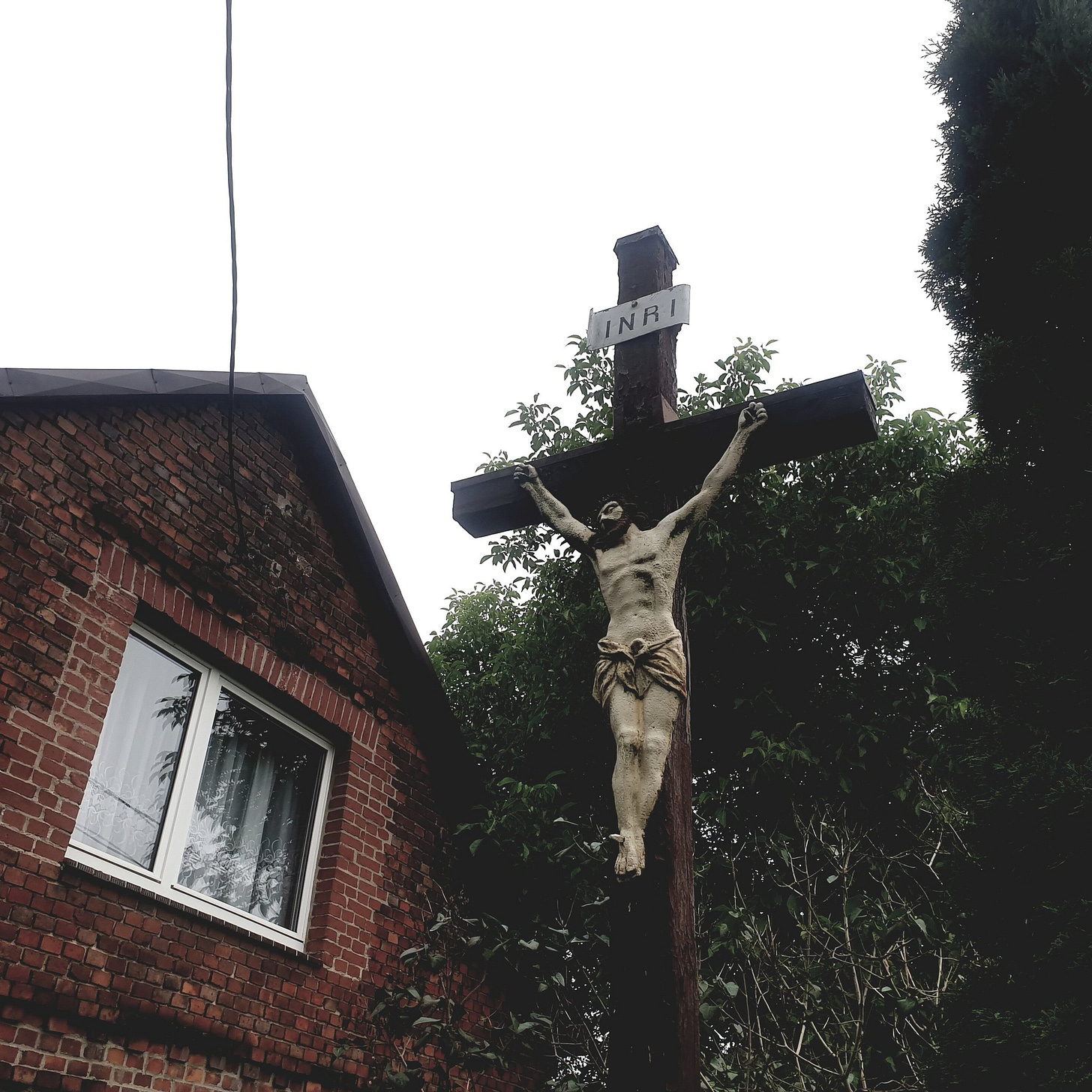

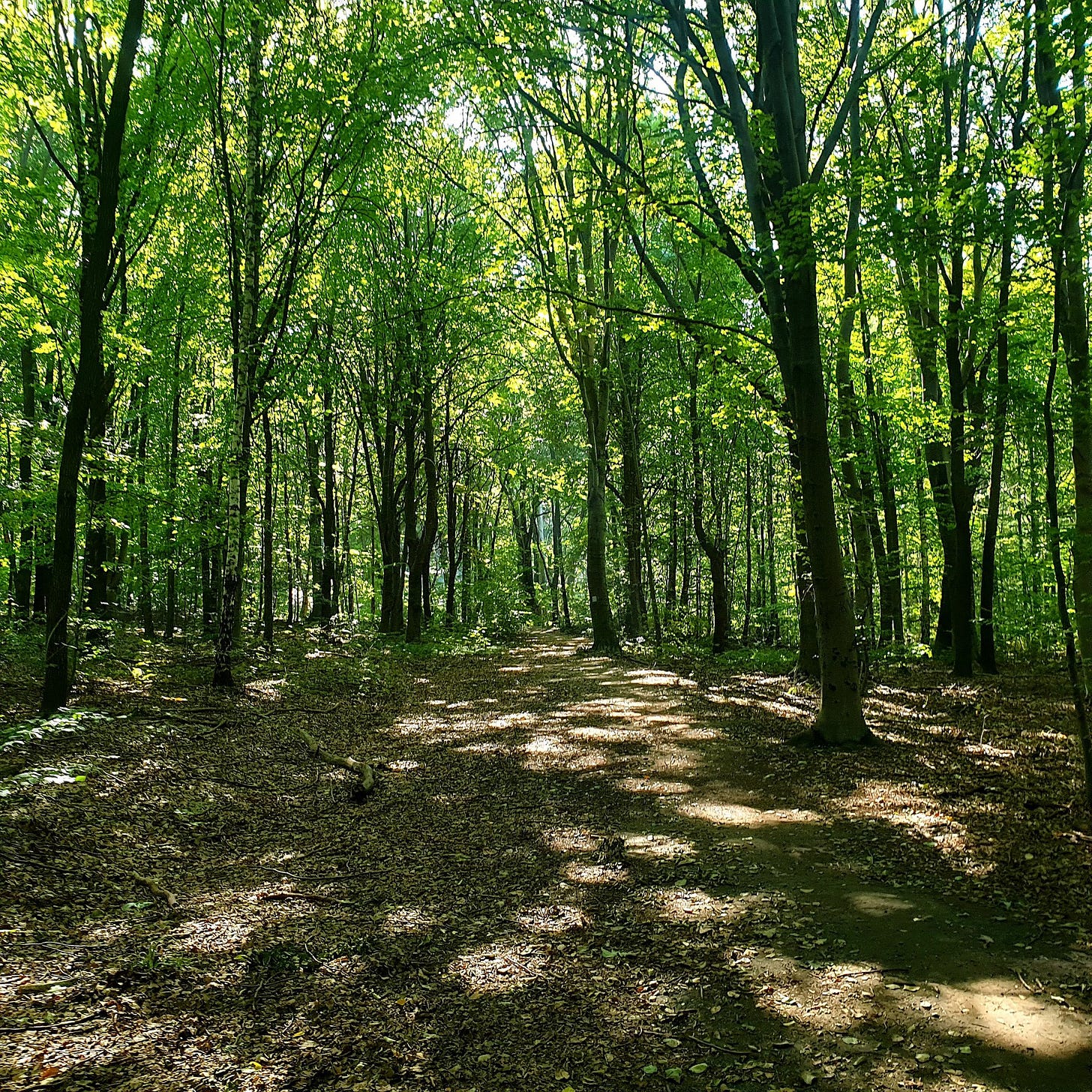
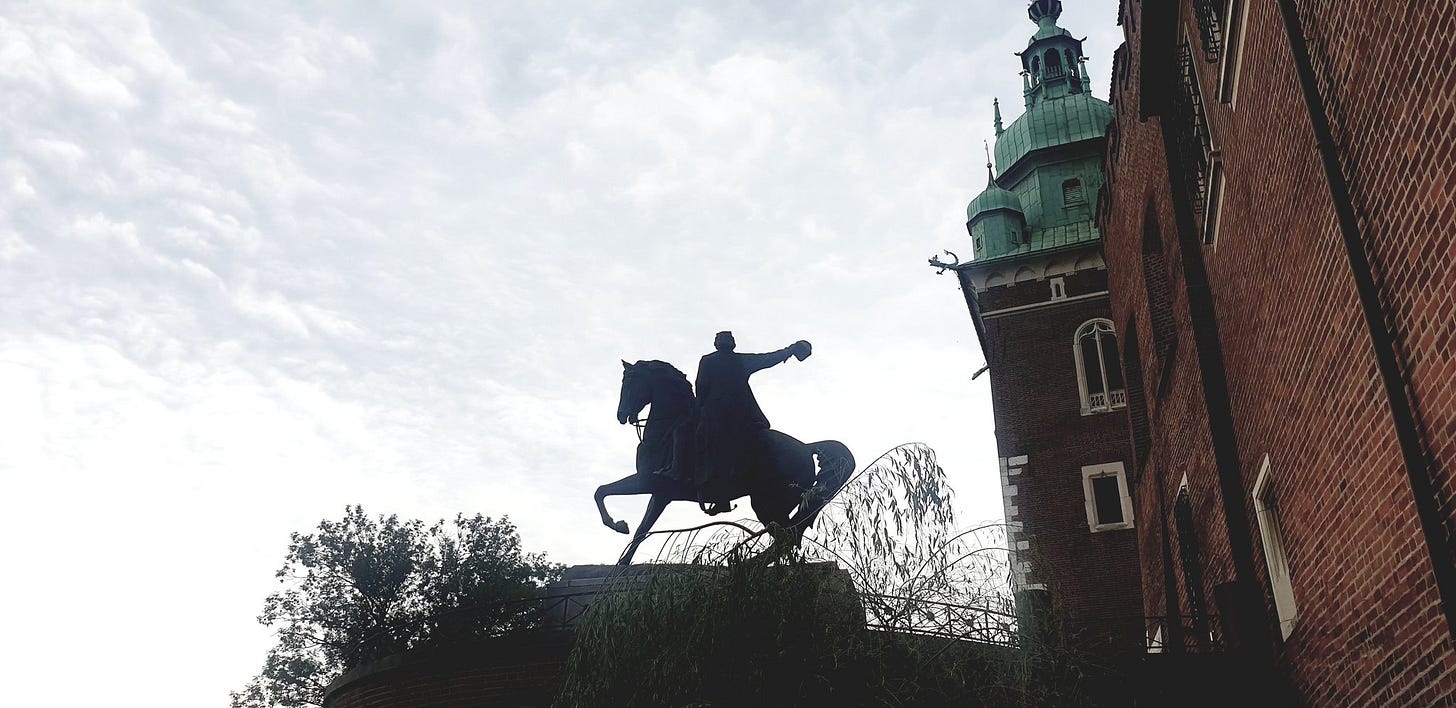
Thanks Ben - it makes me want to visit!
Nicely reflective.
You make me want to hunt down and experience some of the art and literature you flagged, but of course that is highly unlikely.